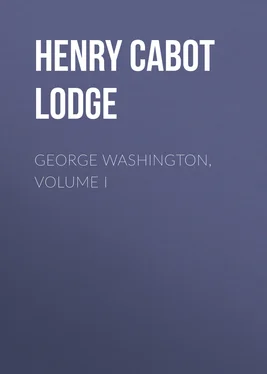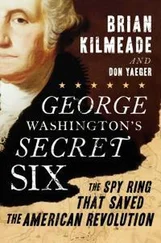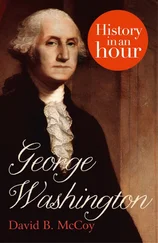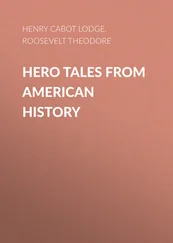Henry Cabot Lodge - George Washington, Volume I
Здесь есть возможность читать онлайн «Henry Cabot Lodge - George Washington, Volume I» — ознакомительный отрывок электронной книги совершенно бесплатно, а после прочтения отрывка купить полную версию. В некоторых случаях можно слушать аудио, скачать через торрент в формате fb2 и присутствует краткое содержание. Жанр: Биографии и Мемуары, История, foreign_edu, foreign_antique, foreign_prose, на английском языке. Описание произведения, (предисловие) а так же отзывы посетителей доступны на портале библиотеки ЛибКат.
- Название:George Washington, Volume I
- Автор:
- Жанр:
- Год:неизвестен
- ISBN:нет данных
- Рейтинг книги:5 / 5. Голосов: 1
-
Избранное:Добавить в избранное
- Отзывы:
-
Ваша оценка:
- 100
- 1
- 2
- 3
- 4
- 5
George Washington, Volume I: краткое содержание, описание и аннотация
Предлагаем к чтению аннотацию, описание, краткое содержание или предисловие (зависит от того, что написал сам автор книги «George Washington, Volume I»). Если вы не нашли необходимую информацию о книге — напишите в комментариях, мы постараемся отыскать её.
George Washington, Volume I — читать онлайн ознакомительный отрывок
Ниже представлен текст книги, разбитый по страницам. Система сохранения места последней прочитанной страницы, позволяет с удобством читать онлайн бесплатно книгу «George Washington, Volume I», без необходимости каждый раз заново искать на чём Вы остановились. Поставьте закладку, и сможете в любой момент перейти на страницу, на которой закончили чтение.
Интервал:
Закладка:
Everything was plentiful except ready money. In this rich and poor were alike. They were all ahead of their income, and it seems as if, from one cause or another, from extravagance or improvidence, from horses or the gaming-table, every Virginian family went through bankruptcy about once in a generation.
When Harry Warrington arrived in England, all his relations at Castlewood regarded the handsome young fellow as a prince, with his acres and his slaves. It was a natural and pleasing delusion, born of the possession of land and serfs, to which the Virginians themselves gave ready credence. They forgot that the land was so plentiful that it was of little value; that slaves were the most wasteful form of labor; and that a failure of the tobacco crop, pledged before it was gathered, meant ruin, although they had been reminded more than once of this last impressive fact. They knew that they had plenty to eat and drink, and a herd of people to wait upon them and cultivate their land, as well as obliging London merchants always ready to furnish every luxury in return for the mortgage of a crop or an estate. So they gave themselves little anxiety as to the future and lived in the present, very much to their own satisfaction.
To the communities of trade and commerce, to the mercantile and industrial spirit of to-day, such an existence and such modes of life appear distressingly lax and unprogressive. The sages of the bank parlors and the counting-rooms would shake their heads at such spendthrifts as these, refuse to discount their paper, and confidently predict that by no possibility could they come to good. They had their defects, no doubt, these planters and farmers of Virginia. The life they led was strongly developed on the animal side, and was perhaps neither stimulating nor elevating. The living was the reverse of plain, and the thinking was neither extremely high nor notably laborious. Yet in this very particular there is something rather restful and pleasant to the eye wearied by the sight of incessant movement, and to the ear deafened by the continual shout that nothing is good that does not change, and that all change must be good. We should probably find great discomforts and many unpleasant limitations in the life and habits of a hundred years ago on any part of the globe, and yet at a time when it seems as if rapidity and movement were the last words and the ultimate ideals of civilization, it is rather agreeable to turn to such a community as the eighteenth-century planters of Virginia. They lived contentedly on the acres of their fathers, and except at rare and stated intervals they had no other interests than those furnished by their ancestral domain. At the court-house, at the vestry, or in Williamsburg, they met their neighbors and talked very keenly about the politics of Europe, or the affairs of the colony. They were little troubled about religion, but they worshiped after the fashion of their fathers, and had a serious fidelity to church and king. They wrangled with their governors over appropriations, but they lived on good terms with those eminent persons, and attended state balls at what they called the palace, and danced and made merry with much stateliness and grace. Their every-day life ran on in the quiet of their plantations as calmly as one of their own rivers. The English trader would come and go; the infrequent stranger would be received and welcomed; Christmas would be kept in hearty English fashion; young men from a neighboring estate would ride over through the darkening woods to court, or dance, or play the fiddle, like Patrick Henry or Thomas Jefferson; and these simple events were all that made a ripple on the placid stream. Much time was given to sports, rough, hearty, manly sports, with a spice of danger, and these, with an occasional adventurous dash into the wilderness, kept them sound and strong and brave, both in body and mind. There was nothing languid or effeminate about the Virginian planter. He was a robust man, quite ready to fight or work when the time came, and well fitted to deal with affairs when he was needed. He was a free-handed, hospitable, generous being, not much given to study or thought, but thoroughly public-spirited and keenly alive to the interests of Virginia. Above all things he was an aristocrat, set apart by the dark line of race, color, and hereditary servitude, as proud as the proudest Austrian with his endless quarterings, as sturdy and vigorous as an English yeoman, and as jealous of his rights and privileges as any baron who stood by John at Runnymede. To this aristocracy, careless and indolent, given to rough pleasures and indifferent to the finer and higher sides of life, the call came, as it comes to all men sooner or later, and in response they gave their country soldiers, statesmen, and jurists of the highest order, and fit for the great work they were asked to do. We must go back to Athens to find another instance of a society so small in numbers, and yet capable of such an outburst of ability and force. They were of sound English stock, with a slight admixture of the Huguenots, the best blood of France; and although for a century and a half they had seemed to stagnate in the New World, they were strong, fruitful, and effective beyond the measure of ordinary races when the hour of peril and trial was at hand.
CHAPTER II
THE WASHINGTONS
Such was the world and such the community which counted as a small fraction the Washington family. Our immediate concern is with that family, for before we approach the man we must know his ancestors. The greatest leader of scientific thought in this century has come to the aid of the genealogist, and given to the results of the latter's somewhat discredited labors a vitality and meaning which it seemed impossible that dry and dusty pedigrees and barren tables of descent should ever possess. We have always selected our race-horses according to the doctrines of evolution, and we now study the character of a great man by examining first the history of his forefathers.
Washington made so great an impression upon the world in his lifetime that genealogists at once undertook for him the construction of a suitable pedigree. The excellent Sir Isaac Heard, garter king-at-arms, worked out a genealogy which seemed reasonable enough, and then wrote to the president in relation to it. Washington in reply thanked him for his politeness, sent him the Virginian genealogy of his own branch, and after expressing a courteous interest said, in his simple and direct fashion, that he had been a busy man and had paid but little attention to the subject. His knowledge about his English forefathers was in fact extremely slight. He had heard merely that the first of the name in Virginia had come from one of the northern counties of England, but whether from Lancashire or Yorkshire, or one still more northerly, he could not tell. Sir Isaac was not thoroughly satisfied with the correctness of his own work, but presently Baker took it up in his history of Northamptonshire, and perfected it to his own satisfaction and that of the world in general. This genealogy derived Washington's descent from the owners of the manor of Sulgrave, in Northamptonshire, and thence carried it back to the Norman knight, Sir William de Hertburn. According to this pedigree the Virginian settlers, John and Lawrence, were the sons of Lawrence Washington of Sulgrave Manor, and this genealogy was adopted by Sparks and Irving, as well as by the public at large. Twenty years ago, however, Colonel Chester, by his researches, broke the most essential link in the chain forged by Heard and Baker, proving clearly that the Virginian settlers could not have been the sons of Lawrence of Sulgrave, as identified by the garter king-at-arms. Still more recently the mythical spirit has taken violent possession of the Washington ancestry, and an ingenious gentleman has traced the pedigree of our first president back to Thorfinn and thence to Odin, which is sufficiently remote, dignified, and lofty to satisfy the most exacting Welshman that ever lived. Still the breach made by Colonel Chester was not repaired, although many writers, including some who should have known better, clung with undiminished faith to the Heard pedigree. It was known that Colonel Chester himself believed that he had found the true line, coming, it is supposed, through a younger branch of the Sulgrave race, but he died before he had discovered the one bit of evidence necessary to prove an essential step, and he was too conscientiously accurate to leave anything to conjecture. Since then the researches of Mr. Henry E. Waters have established the pedigree of the Virginian Washingtons, and we are now able to know something of the men from whom George Washington drew his descent.
Читать дальшеИнтервал:
Закладка:
Похожие книги на «George Washington, Volume I»
Представляем Вашему вниманию похожие книги на «George Washington, Volume I» списком для выбора. Мы отобрали схожую по названию и смыслу литературу в надежде предоставить читателям больше вариантов отыскать новые, интересные, ещё непрочитанные произведения.
Обсуждение, отзывы о книге «George Washington, Volume I» и просто собственные мнения читателей. Оставьте ваши комментарии, напишите, что Вы думаете о произведении, его смысле или главных героях. Укажите что конкретно понравилось, а что нет, и почему Вы так считаете.












